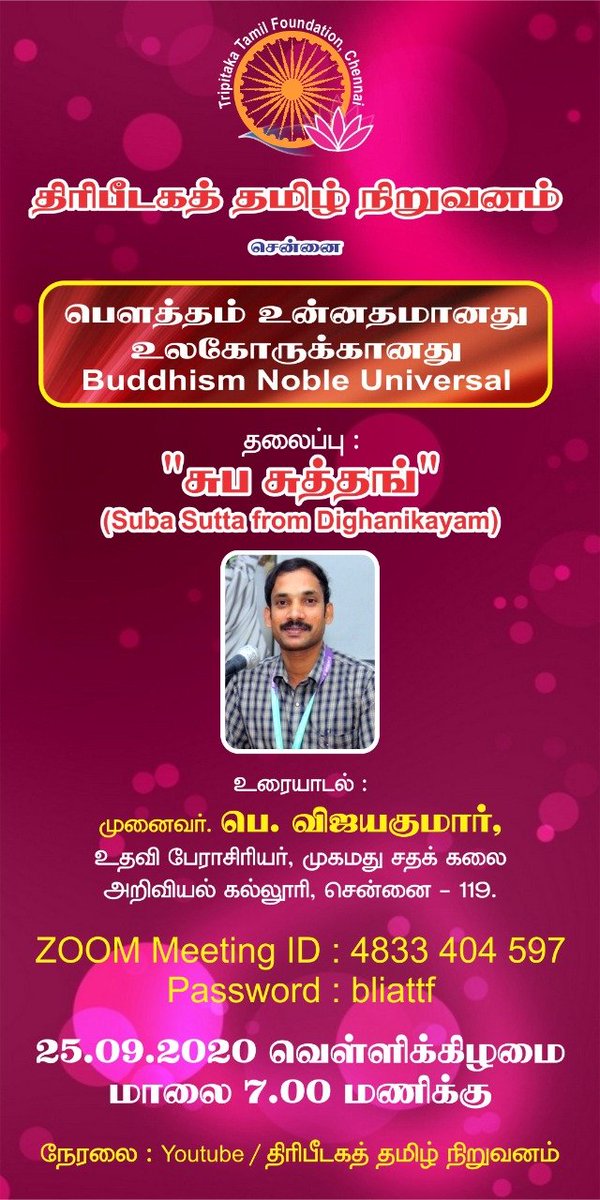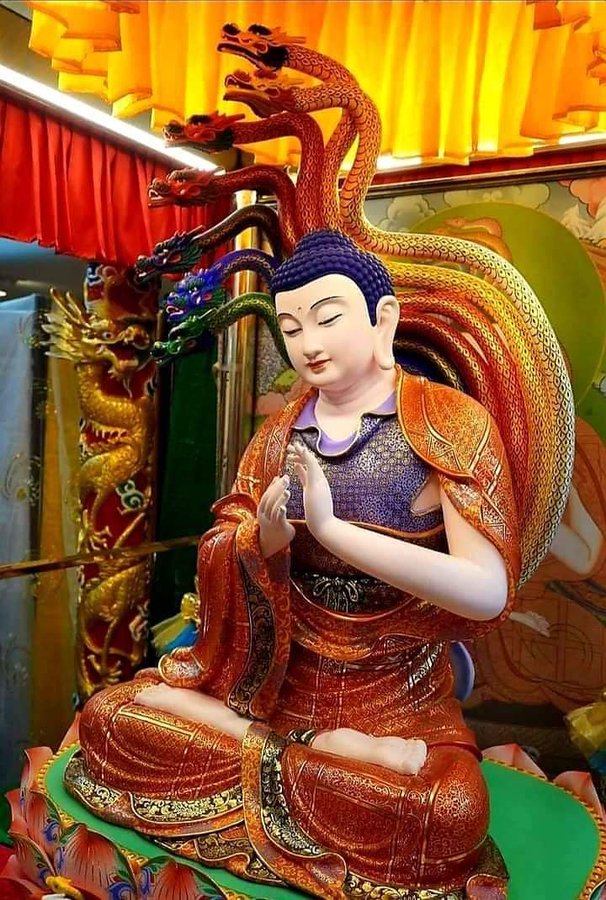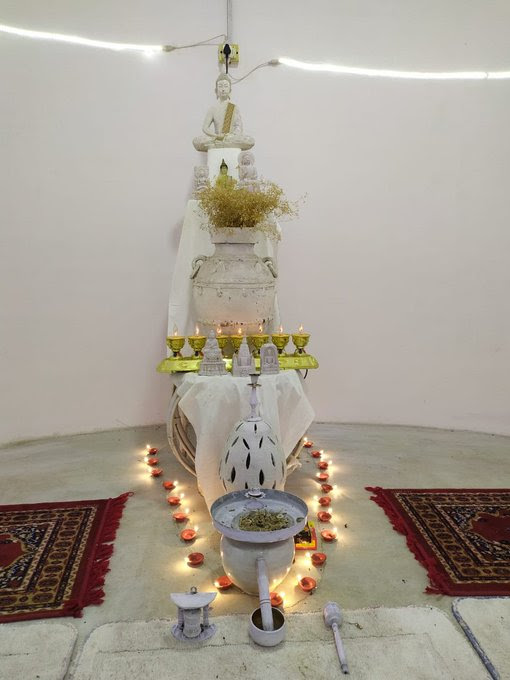For The Welfare, Happiness, Peace of All Sentient and Non-Sentient Beings and for them to Attain Eternal Peace as Final Goal.
KUSHINARA NIBBANA BHUMI PAGODA-It
At
WHITE HOME
668, 5A main Road, 8th Cross, HAL III Stage, Prabuddha Bharat Puniya Bhumi Bengaluru
Magadhi Karnataka State PRABUDDHA BHARAT Subha Sutta (Digna Nikaya)
Please Visit and post to: https://www.buddha-vacana.org/ https://www.facebook.com/
is a 18 feet Dia All White Pagoda with a table or, but be sure
to having above head level based on the usual use of the room. in
116 CLASSICAL LANGUAGES and planning to project Important Places like
Lumbini, Bodh gaya, Saranath, Kushinara, Etc., in a circle vision akin
to Circarama
a just born baby is kept isolated without anyone communicating with the
baby, after a few days it will speak and human natural (Prakrit)
language known as Classical Magahi Magadhi/Classical Chandaso language/
which are the same. Buddha spoke in Magadhi. All the 7111 languages and
dialects are off shoot of Classical Magahi Magadhi. Hence all of them
are Classical in nature (Prakrit) of Human Beings, just like all other
living speices have their own naturallanguages for communication. 116
languages are translated by
https://translate.google.com

Subha Sutta
Damsak1
11.7K subscribers
Venerable Kiribathgoda Gnanananda Thero
metta.lk/tipitaka/2Sutt

1. Thus have I heard. The venerable ânanda was once staying at Sàvatthi
in the Jeta Wood, in Anàthapiõóika’s pleasaunce, shortly after the
Exalted One had died away. Now at that time the young Brahman Subha, the
son of the man of Tudi, was dwelling at Sàvatthi on some business or
other.
now, young man. Go to the Samaõa ânanda, and ask in my name as to
whether his sickness and indisposition has abated, as to his health and
vigour and condition of ease; and say: ßTwere well if the venerable
ânanda would be so kind as to pay a visit to Subha, the young Brahman,
the son of the man of Tudi.û
`Very well, Sir,’ said that young man in reply. And he went to the
place where the venerable ânanda was staying, and exchanged with him the
greetings and compliments of politeness and courtesy, and took his seat
apart. And, so seated, he delivered to the venerable ânanda the message
with which he had been charged.
is not just now, young man, convenient, for I have just taken medicine.
But perhaps I may be able to go on the morrow, if so be that conditions
and opportunity seem fit.’
Sir, the matter has been so far accomplished that perhaps the venerable
ânanda may be able to come on the morrow, if so be that conditions and
opportunity seem fit.’
And the venerable ânanda, when the night had passed away, dressed
himself early in the morning, and went, in his robes and carrying his
bowl, with a Bhikkhu from the Cetiya country as his attendant, to
Subha’s house, and took his seat on the mat spread out for him. And
Subha, the young Brahman, the son of the man of Tudi, came there where
he sat, and exchanged with the venerable ânanda the greetings and
compliments of politeness and courtesy, and took his seat on one side.
And, so seated, he said to the venerable ânanda:
Sir, have waited long on the venerable Gotama, constantly near him,
continually in his company. You, Sir, will know what were the things the
venerable Gotama was wont to praise; to which he used to incite the
folk, in which he established them, and made them firm. What were they,
ânanda?’
`Three are the bodies of doctrine, O Brahman, which the Exalted One was
wont to praise; to which he used to incite the folk, in which he
established them, and made them firm. And what are the three? The so
noble body of doctrine regarding right conduct, the so noble body of
doctrine regarding self-concentration, the so noble body of doctrine
regarding intelligence.’
what, ânanda, is this so noble body of doctrine regarding right conduct
(Sãla) in praise of which the venerable Gotama was wont to speak; to
which he used to incite the folk, in which he established them, and made
them firm?’
is this, ânanda, and mysteriousÞboth that this so noble group of
conduct is well-rounded, not incomplete ; and that I perceive no other,
like unto it, among the other Samaõas and Bràhmaõas outside of this
communion. And were they also to perceive such in themselves, then would
they be satisfied with thus much, and would say: ßSo far is enough. We
have done thus much. The aim of our Samaõaship has been reached.û But
you, ânanda, on the other hand, say: ßThere is yet something further,
according to your system, still to be done.û
1. `And what, ânanda, is this so noble body of doctrine regarding
self-concentration (samàdhi) in praise of which the venerable Gotama was
wont to speak; to which he used to incite the folk, in which he
established them, and made them firm?’
`And what, ânanda, is this so noble body of doctrine regarding
intellect (pa¤¤à) in praise of which the venerable Gotama was wont to
speak; to which he used to incite the folk, in which he established
them, and made them firm?’
`This, young Brahman, is that so noble body of doctrine regarding
intellect, of which that Exalted One was wont to speak in praise;, to
which he used to incite the folk, in which he established them, and made
them firm.’
is this, ânanda, and mysteriousÞboth that this so noble group of
doctrine regarding intellect is well-rounded, not incomplete; and that I
perceive no other, like unto it, among the other Samaõas and Bràhmaõas
outside of this communion.
there is not, in this matter, anything further to be accomplished. Most
excellent, ânanda, are the words of thy mouth, most excellent! Just as
if a man were to set up that which has been thrown down, or were to
reveal that, which has been hidden away, or were to point out the right
road to him who has gone astray, or were to bring a light into the
darkness so that those who have eyes could see external formsÞjust even
so has the truth been made known to me, in many a figure, by the
venerable ânanda. And I, even I, betake myself to that venerable Gotama
as my guide, to the truth, and to the Order. May the venerable ânanda
receive me as an adherent, as one who, from this day forth, as long as
life endures, has taken them as his guide.’
I. 1. Thus have I heard. The venerable Ānanda was once staying at
Sāvatthi in the Jeta Wood, in Anāthapiṇḍika’s pleasaunce, shortly after
the Exalted One had died away [1]. Now at that time the young Brahman
Subha, the son of the man of Tudi [2], was dwelling at Sāvatthi on some
business or other.
now, young man. Go to the Samaṇa Ānanda, and ask in my name as to
whether his sickness and indisposition has abated, as to his health and
vigour and condition of ease; and say: “Twere well if the venerable
Ānanda would be so kind as to pay a visit to Subha, the young Brahman,
the son of the man of Tudi.”
‘Very well, Sir,’ said that young man in reply. And he went to the
place where the venerable Ānanda was staying, and exchanged with him the
greetings and compliments of politeness and courtesy, and took his seat
apart. And, so seated, he delivered to the venerable Ānanda the message
with which he had been charged.
is not just now, young man, convenient, for I have just taken medicine.
But perhaps I may be able to go on the morrow, if so be that conditions
and opportunity seem fit.’
Sir, the matter has been so far accomplished that perhaps the venerable
Ānanda may be able to come on the morrow, if so be that conditions and
opportunity seem fit.’
And the venerable Ānanda, when the night had passed away, dressed
himself early in the morning, and went, in his robes and carrying his
bowl, with a Bhikkhu from the Cetiya country as his attendant, to
Subha’s house, and took his seat on the mat spread out for him. And
Subha, the young Brahman, the son of the man of Tudi, came there where
he sat, and exchanged with the venerable Ānanda the greetings and
compliments of politeness and courtesy, and took his seat on one side.
And, so seated, he said to the venerable Ānanda:
‘You, Sir, have waited long on the venerable Gotama, constantly near
him, continually in his company. You, Sir, will know what were the
things the venerable Gotama was wont to praise; to which he used to
incite the folk, in which he established them, and made them firm. What
were they, Ānanda?’
‘Three are the bodies of doctrine, O Brahman, which the Exalted One was
wont to praise; to which he used to incite the folk, in which he
established them, and made them firm. And what are the three? The so
noble body of doctrine regarding right conduct, the so noble body of
doctrine regarding self-concentration, the so noble body of doctrine
regarding intelligence [3].’
what, Ānanda, is this so noble body of doctrine regarding right conduct
(Sīla) in praise of which the venerable Gotama was wont to speak; to
which he used to incite the folk, in which he established them, and made
them firm?’
is this, Ānanda, and mysterious—both that this so noble group of
conduct is well-rounded, not incomplete ; and that I perceive no other,
like unto it, among the other Samaṇas and Brāhmaṇas outside of this
communion. [207] And were they also to perceive such in themselves, then
would they be satisfied with thus much, and would say: “So far is
enough. We have done thus much. The aim of our Samaṇaship has been
reached.” But you, Ānanda, on the other hand, say: “There is yet
something further, according to your system, still to be done.”
1. ‘And what, Ānanda, is this so noble body of doctrine regarding
self-concentration (samādhi) in praise of which the venerable Gotama was
wont to speak; to which he used to incite the folk, in which he
established them, and made them firm?’
The emancipation of heart from the Five Hindrances—covetousness,
ill-temper, sloth of body and mind, excitement and worry, and
perplexity.
the answer is followed by the same injunction as to something further
to he done, and the same rejoinder as above in Chapter 1, 30.]
20. ‘And what, Ānanda, is this so noble body of doctrine regarding
intellect (paññā) in praise of which the venerable Gotama was wont to
speak; to which he used to incite the folk, in which he established
them, and made them firm?’
The ñāṇa-dassana—the insight which sees that the body is impermanent,
and that mind (viññāṇa) is bound up with it, has no existence
independent of it.
The perception of the Four Truths as to sorrow and the Eightfold Path;
the rooting out of one’s mind of the Intoxicants (the Āsavas); and the
final assurance, consequent thereon, of Emancipation gained.]
27. ‘This, young Brahman, is that so noble body of doctrine regarding
intellect, of which that Exalted One was wont to speak in praise;, to
which he used to incite the folk, in which he established them, and made
them firm.’
‘Wonderful is this, Ānanda, and mysterious—both that this so noble
group of doctrine regarding intellect is well-rounded, not incomplete;
and that I perceive no other, like unto it, among the other Samaṇas and
Brāhmaṇas outside of this communion.
271/] And there is not, in this matter, anything further to be
accomplished. Most excellent, Ānanda, are the words of thy mouth, most
excellent! Just as if a man were to set up that which has been thrown
down, or were to reveal that, which has been hidden away, or were to
point out the right road to him who has gone astray, or were to bring a
light into the darkness so that those who have eyes could see external
forms—just even so has the truth been made known to me, in many a
figure, by the venerable Ānanda. And I, even I, betake myself to that
venerable Gotama as my guide, to the truth, and to the Order. May the
venerable Ānanda receive me as an adherent, as one who, from this day
forth, as long as life endures, has taken them as his guide.’
101) Classical Tamil-பாரம்பரிய இசைத்தமிழ் செம்மொழி,



https://yesterland.com/circarama.html
https://www.ethnologue.com/guides/how-many-languages
How many languages are there in the world?
number is constantly in flux, because we’re learning more about the
world’s languages every day. And beyond that, the languages themselves
are in flux. They’re living and dynamic, spoken by communities whose
lives are shaped by our rapidly changing world. This is a fragile time:
Roughly 40% of languages are now endangered, often with less than 1,000
speakers remaining. Meanwhile, just 23 languages account for more than
half the world’s population.
When
a just born baby is kept isolated without anyone communicating with the
baby, after a few days it will speak and human natural (Prakrit)
language known as Classical Magahi Magadhi/Classical Chandaso language/
which are the same. Buddha spoke in Magadhi. All the 7111 languages and
dialects are off shoot of Classical Magahi Magadhi. Hence all of them
are Classical in nature (Prakrit) of Human Beings, just like all other
living speices have their own naturallanguages for communication. 116
languages are translated by
https://translate.google.com
04) Classical Hela Basa (Hela Language),
25) Classical Croatian-Klasična hrvatska, 115) Classical Yoruba-Yoruba Yoruba, 116) Classical Zulu-I-Classical Zulu
05) Classical Pāḷi
07) Classical Cyrillic
08) Classical Afrikaans– Klassieke Afrikaans
09) Classical Albanian-Shqiptare klasike,
10) Classical Amharic-አንጋፋዊ አማርኛ,
11) Classical Arabic-اللغة العربية الفصحى
12) Classical Armenian-դասական հայերեն,
13) Classical Azerbaijani- Klassik Azərbaycan,
14) Classical Basque- Euskal klasikoa,
15) Classical Belarusian-Класічная беларуская,
16) Classical Bengali-ক্লাসিক্যাল বাংলা,
17) Classical Bosnian-Klasični bosanski,
18) Classical Bulgaria- Класически българск,
19) Classical Catalan-Català clàssic
20) Classical Cebuano-Klase sa Sugbo,
21) Classical Chichewa-Chikale cha Chichewa,
22) Classical Chinese (Simplified)-古典中文(简体),
23) Classical Chinese (Traditional)-古典中文(繁體),
24) Classical Corsican-Corsa Corsicana,
26) Classical Czech-Klasická čeština,
27) Classical Danish-Klassisk dansk,Klassisk dansk,
28) Classical Dutch- Klassiek Nederlands,
29) Classical English,Roman
30) Classical Esperanto-Klasika Esperanto,
31) Classical Estonian- klassikaline eesti keel,
32) Classical Filipino klassikaline filipiinlane,
33) Classical Finnish- Klassinen suomalainen,
34) Classical French- Français classique,
35) Classical Frisian- Klassike Frysk,
36) Classical Galician-Clásico galego,
37) Classical Georgian-კლასიკური ქართული,
38) Classical German- Klassisches Deutsch,
39) Classical Greek-Κλασσικά Ελληνικά,
40) Classical Gujarati-ક્લાસિકલ ગુજરાતી,
41) Classical Haitian Creole-Klasik kreyòl,
42) Classical Hausa-Hausa Hausa,
43) Classical Hawaiian-Hawaiian Hawaiian,
44) Classical Hebrew- עברית קלאסית
45) Classical Hmong- Lus Hmoob,
46) Classical Hungarian-Klasszikus magyar,
47) Classical Icelandic-Klassísk íslensku,
48) Classical Igbo,Klassískt Igbo,
49) Classical Indonesian-Bahasa Indonesia Klasik,
50) Classical Irish-Indinéisis Clasaiceach,
51) Classical Italian-Italiano classico,
52) Classical Japanese-古典的なイタリア語,
53) Classical Javanese-Klasik Jawa,
54) Classical Kannada- ಶಾಸ್ತ್ರೀಯ ಕನ್ನಡ,
55) Classical Kazakh-Классикалық қазақ,
56) Classical Khmer- ខ្មែរបុរាណ,
59) Classical Kurdish (Kurmanji)-Kurdî (Kurmancî),
60) Classical Kyrgyz-Классикалык Кыргыз,
61) Classical Lao-ຄລາສສິກລາວ,
62) Classical Latin-LXII) Classical Latin,
63) Classical Latvian-Klasiskā latviešu valoda,
64) Classical Lithuanian-Klasikinė lietuvių kalba,
65) Classical Luxembourgish-Klassesch Lëtzebuergesch,
66) Classical Macedonian-Класичен македонски,
67) Classical Malagasy,класичен малгашки,
68) Classical Malay-Melayu Klasik,
69) Classical Malayalam-ക്ലാസിക്കൽ മലയാളം,
70) Classical Maltese-Klassiku Malti,
71) Classical Maori-Maori Maori,
72) Classical Marathi-क्लासिकल माओरी,
73) Classical Mongolian-Сонгодог Монгол,
74) Classical Myanmar (Burmese)-Classical မြန်မာ (ဗမာ),
75) Classical Nepali-शास्त्रीय म्यांमार (बर्मा),
76) Classical Norwegian-Klassisk norsk,
79) Classical Persian-کلاسیک فارسی
80) Classical Polish-Język klasyczny polski,
81) Classical Portuguese-Português Clássico,
82) Classical Punjabi-ਕਲਾਸੀਕਲ ਪੰਜਾਬੀ,
83) Classical Romanian-Clasic românesc,
84) Classical Russian-Классический русский,
85) Classical Samoan-Samoan Samoa,
86) Classical Sanskrit छ्लस्सिचल् षन्स्क्रित्
87) Classical Scots Gaelic-Gàidhlig Albannach Clasaigeach,
89) Classical Sesotho-Seserbia ea boholo-holo,
90) Classical Shona-Shona Shona,
91) Classical Sindhi,
92) Classical Sinhala-සම්භාව්ය සිංහල,
93) Classical Slovak-Klasický slovenský,
94) Classical Slovenian-Klasična slovenska,
95) Classical Somali-Soomaali qowmiyadeed,
96) Classical Spanish-Español clásico,
97) Classical Sundanese-Sunda Klasik,
98) Classical Swahili,Kiswahili cha Classical,
99) Classical Swedish-Klassisk svensk,
100) Classical Tajik-тоҷикӣ классикӣ,
101) Classical Tamil-பாரம்பரிய இசைத்தமிழ் செம்மொழி,
104) Classical Thai-ภาษาไทยคลาสสิก,
105) Classical Turkish-Klasik Türk,
108) Classical Urdu- کلاسیکی اردو
111) Classical Vietnamese-Tiếng Việ
113) Classical Xhosa-IsiXhosa zesiXhosa,
114) Classical Yiddish- קלאסישע ייִדיש![]()
|

jcs4ever@outlook.com
Classical Buddhism (Teachings of the Awakened One with Awareness) belong to the world, and everyone have exclusive rights: JC
is the most Positive Energy of informative and research oriented site propagating the teachings of the Awakened One with Awareness the Buddha and on Techno-Politico-Socio
Transformation and Economic Emancipation Movement followed by millions of people all over the world in 116 Classical languages. |



UPASAKA JAGATHEESAN CHANDRASEKHARAN





